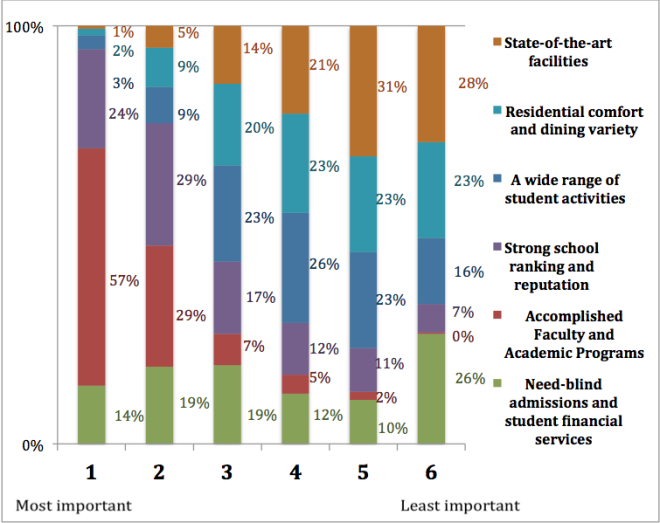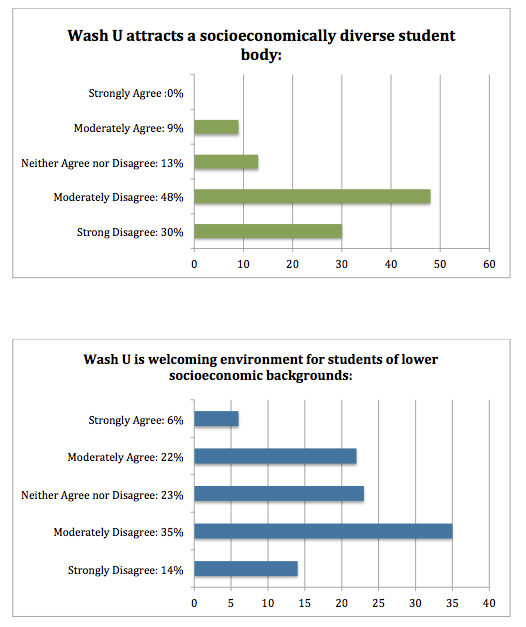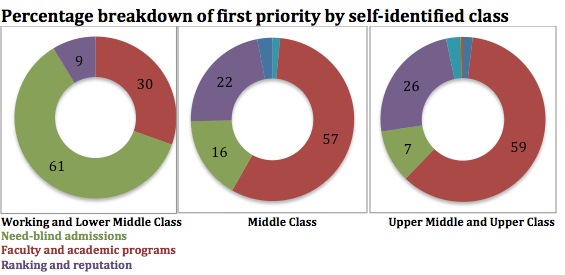Survey Reveals Divide in Student Priorities Along Class Lines
BY SONYA SCHOENBERGER
In January 2013, Washington University United for Socioeconomic Diversity (WU/FUSED) surveyed the Wash U student body to gauge levels and perceptions of socioeconomic diversity on campus. The survey, which received 275 undergraduate responses (about 5% of the student body), revealed that Wash U students acknowledge the lack of socioeconomic diversity on campus, but are divided along class lines about the importance of moving towards need-blind admissions.
 The survey asked students to rank their priorities for endowment allocation across six categories: accomplished faculty and academic programs, strong school reputation, residential comfort, a wide range of student activities, state-of-the-art facilities, and need-blind admissions and student financial services.
The survey asked students to rank their priorities for endowment allocation across six categories: accomplished faculty and academic programs, strong school reputation, residential comfort, a wide range of student activities, state-of-the-art facilities, and need-blind admissions and student financial services.
Generally, students judged academic programs and school reputation to be most important, and facilities, residential comfort, and student activities to be least important. Need-blind admissions and student financial services fell somewhere in the middle, although over 25% of students ranked it as their last priority.
When the responses were broken down by class, a clear pattern emerged. Of the 67% of respondents identified as upper or upper-middle class, 7% identified need-blind admissions as their top priority in endowment allocation. In contrast, a full 61% of those who identified as working or lower middle class selected need-blind admissions as a top priority.
These responses highlight a key obstacle to bringing issues of socioeconomic diversity to the table at Wash U: those most invested in making the University accessible and affordable are students from working or lower-middle class backgrounds, who constitute a minority of the Wash U student body.
The median student reported an annual household income in the $150,000-$199,999 range, and self-identified as upper middle class. Some students’ self-identified class did not match their reported family income level. At least one student with a reported family income in the $90,000-$99,000 range identified as “working class”; 40% of students who identified as “middle class” reported an annual family income in excess of $100,000. According to the US Census Bureau, the median household income in 2012 was just over $50,000.
 The WU/FUSED survey also sought to gauge the degree to which students feel that Wash U attracts and supports a socioeconomically diverse student body. Only 9% of surveyed students agreed that the University attracts students from diverse class backgrounds; 28% agreed that the University provides a welcoming environment for students of lower class backgrounds.
The WU/FUSED survey also sought to gauge the degree to which students feel that Wash U attracts and supports a socioeconomically diverse student body. Only 9% of surveyed students agreed that the University attracts students from diverse class backgrounds; 28% agreed that the University provides a welcoming environment for students of lower class backgrounds.
At the end of the survey, students were asked to provide suggestions for improving socioeconomic diversity on campus. Some answered that supporting more students from lower income backgrounds would be impossible, or feasible only at the expense of those students paying full freight–“the antithesis of fairness.” The overwhelming response, though, was a call to “go need-blind”.
The students who responded to this survey nearly unanimously agreed that socioeconomic diversity is lacking at Washington University. They were more divided, however, over how highly they prioritized the accessibility of a Wash U education. Most students concurred that financial services and need-blind admissions are more important than facilities and residential comforts. But working and lower-middle class students placed a much higher relative value on socioeconomic diversity than their wealthier peers, who cared more about academic programs and school ranking and reputation. Wash U has risen dramatically in national rankings over the past decade, but it has also received attention in recent years for lagging behind other elite institutions in efforts to recruit poor and middle class students. Until all Wash U students–not just those from lower class backgrounds–recognize socioeconomic diversity as an important University priority, the demographics represented in this survey are unlikely to change significantly over coming years.
Sonya Schoenberger is co-president of Washington University for Undergraduate Socioeconomic Diversity (WU/FUSED), a group of Wash U students who seek promote open discussion about class issues on campus. WU/FUSED is an affiliate of U/FUSED, a national advocacy group for diversity in higher education.
*WU/FUSED put out a similar survey in 2009.

